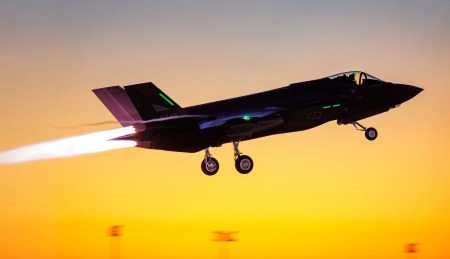Strategic Stakes Rise as $100 Billion Package Looms During Trump’s Gulf Tour
WASHINGTON AND RIYADH are reportedly close to finalising a new $100 billion arms package as Trump’s Gulf trip nears. The US is poised to offer Saudi Arabia a defence package worth well over $100 billion, sources told Reuters, adding that the proposal is being prepared for announcement during President Donald Trump’s visit to the kingdom in May.
The US may offer a major arms package to Saudi Arabia, expected to be unveiled during President Trump’s upcoming visit. During the Middle East tour, Trump is also expected to visit the UAE and Qatar.
According to US officials cited by Reuters, the proposed deal with Saudi Arabia is estimated to exceed $100 billion, making it one of the largest military agreements of the current administration and a continuation of the strong defence ties between the two nations.

The package is expected to include a range of advanced military systems, such as drones like the MQ-9 Reaper, precision-guided munitions, and advanced air and missile defence systems.
This prospective deal is seen as both a revival and an expansion of the 2017 strategic framework. In May 2017, during President Trump’s first official overseas visit to Riyadh, the US and Saudi Arabia announced a sweeping arms agreement valued at $110 billion, with a projected total of up to $350 billion over the following decade.
It was hailed as one of the largest arms deals in US history and formed the centrepiece of renewed strategic cooperation between Washington and Riyadh. The deal also included significant upgrades to communications, cybersecurity infrastructure, and command-and-control systems to improve interoperability with US forces.
In December 2011, under the Barack Obama administration, the US finalised a landmark arms deal with Saudi Arabia valued at $29.4 billion. The agreement was one of the most significant bilateral defence deals of the time and was formally confirmed by the US Department of Defence.
Under the 2011 deal, F-15SA (Saudi Arabia) deliveries began in the mid-2010s and had a visible impact on Saudi Arabia’s military operations. The agreement also bolstered the kingdom’s strategic goals by ensuring sustained air superiority and reinforcing the US-Saudi defence partnership in an increasingly volatile region.
Ahead of the May 2025 visit, discussions have also emerged about the potential sale of Lockheed Martin’s F-35 fighter jets to Saudi Arabia.
According to Reuters, Saudi Arabia has long expressed interest in acquiring these advanced stealth aircraft. However, three sources familiar with the matter have downplayed the likelihood of a deal being finalised during Trump’s upcoming trip.
This development raises questions about the strategic and geopolitical complexities surrounding one of the world’s most coveted military platforms and its implications for US-Saudi relations in a volatile region.

F-35 fighter jet
For Saudi Arabia, acquiring the F-35 would significantly enhance its air force, which currently relies on older platforms like the F-15 Eagle and Eurofighter Typhoon.
The allure of the F-35 for Saudi Arabia lies not only in its technological superiority but also in its strategic value. The kingdom faces a complex security environment, marked by ongoing tensions with Iran, Houthi attacks from Yemen, and the need to maintain regional influence.
However, the path to acquiring the F-35 is fraught with challenges, primarily due to US policy commitments to Israel’s Qualitative Military Edge (QME). Under US law, arms sales to Middle Eastern nations must ensure that Israel retains a technological and operational advantage over its Arab neighbours.
Israel has operated F-35s since 2016, making it the only Middle Eastern nation with the jet. This exclusivity reinforces Israel’s air superiority — a cornerstone of its defence strategy. Furthermore, the US Congress, which has historically scrutinised arms deals with Arab states, may oppose such a deal to maintain QME requirements.
The sensitivity of this issue was evident in 2021 when the United Arab Emirates secured a $23 billion deal for 50 F-35s — but only after normalising ties with Israel through the Abraham Accords, thereby addressing regional balance concerns. Saudi Arabia, which has not yet normalised relations with Israel, faces a higher bar, as such a deal could be seen as undermining Israel’s strategic position.
The downplaying of an F-35 deal during Trump’s upcoming visit, as reported by Reuters, reflects the intricate balance of diplomacy and domestic politics.
Several factors may be contributing to this caution. First, the technical and bureaucratic hurdles of exporting the F-35 are substantial. The process involves rigorous security assessments to prevent technology leaks — particularly to adversaries like China, which has been a concern in past deals with Gulf states. Second, congressional approval remains a major obstacle.
 The kingdom’s engagements with Turkey, Russia, and China highlight the risks of a prolonged stalemate. At the same time, the US must weigh the benefits of arming Saudi Arabia against potential backlash from Israel and domestic critics.
The kingdom’s engagements with Turkey, Russia, and China highlight the risks of a prolonged stalemate. At the same time, the US must weigh the benefits of arming Saudi Arabia against potential backlash from Israel and domestic critics.
Essentially, the prospect of Saudi Arabia acquiring the F-35 remains a distant goal, overshadowed by geopolitical, political, and technical challenges. The jet’s unmatched capabilities make it a highly desirable acquisition, but the constraints of US policy and regional dynamics suggest any such deal is years away — if it materialises at all.
Ultimately, the timing of Trump’s visit suggests a focus on economic and investment agreements, as reflected in his earlier statements about securing $1 trillion in Saudi investments in the US. An F-35 deal, with its long lead times and political sensitivities, may not align with the immediate goals of this trip.
Trump’s visit to Riyadh will likely centre on reinforcing economic and security ties, with the broader arms package serving as a tangible outcome. Yet the F-35’s absence from immediate negotiations underscores the delicate balance of power in the Middle East, where strategic interests, alliances, and rivalries intersect.
As Saudi Arabia continues to modernise its military, the question remains: will the kingdom eventually secure the F-35, or will it turn to other partners to meet its ambitions? The answer may shape the region’s strategic landscape for decades to come. ![]()
________
Also Read:
Terror in Pahalgam: The Jugular Vein Doctrine
Disclaimer : PunjabTodayNews.com and other platforms of the Punjab Today group strive to include views and opinions from across the entire spectrum, but by no means do we agree with everything we publish. Our efforts and editorial choices consistently underscore our authors’ right to the freedom of speech. However, it should be clear to all readers that individual authors are responsible for the information, ideas or opinions in their articles, and very often, these do not reflect the views of PunjabTodayNews.com or other platforms of the group. Punjab Today does not assume any responsibility or liability for the views of authors whose work appears here.
Punjab Today believes in serious, engaging, narrative journalism at a time when mainstream media houses seem to have given up on long-form writing and news television has blurred or altogether erased the lines between news and slapstick entertainment. We at Punjab Today believe that readers such as yourself appreciate cerebral journalism, and would like you to hold us against the best international industry standards. Brickbats are welcome even more than bouquets, though an occasional pat on the back is always encouraging. Good journalism can be a lifeline in these uncertain times worldwide. You can support us in myriad ways. To begin with, by spreading word about us and forwarding this reportage. Stay engaged.
— Team PT

